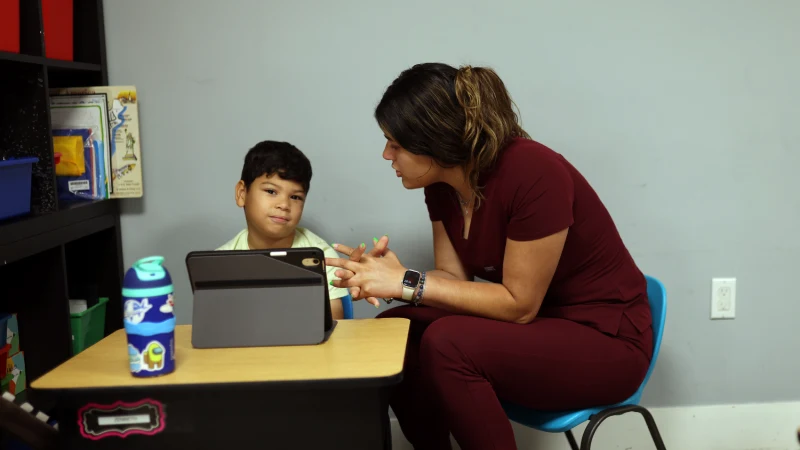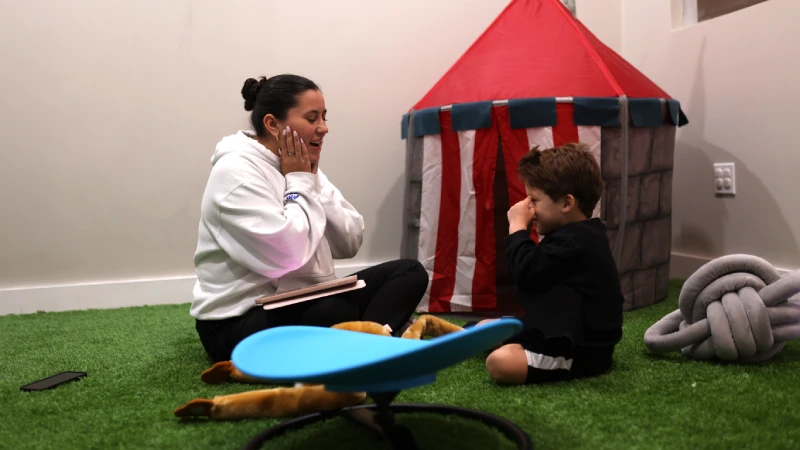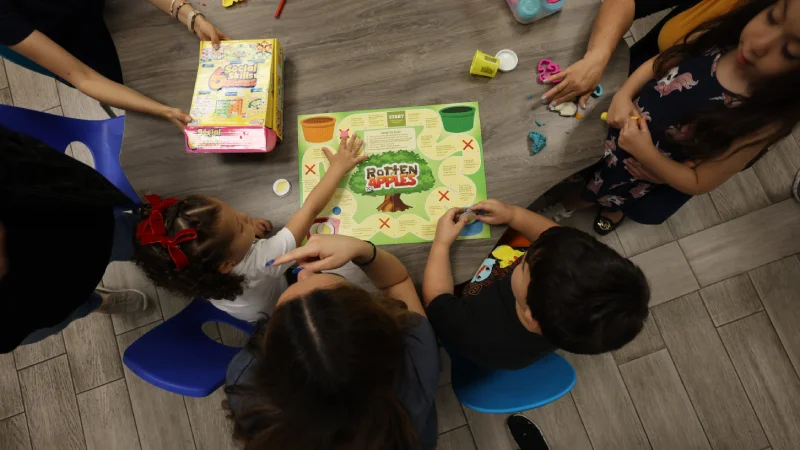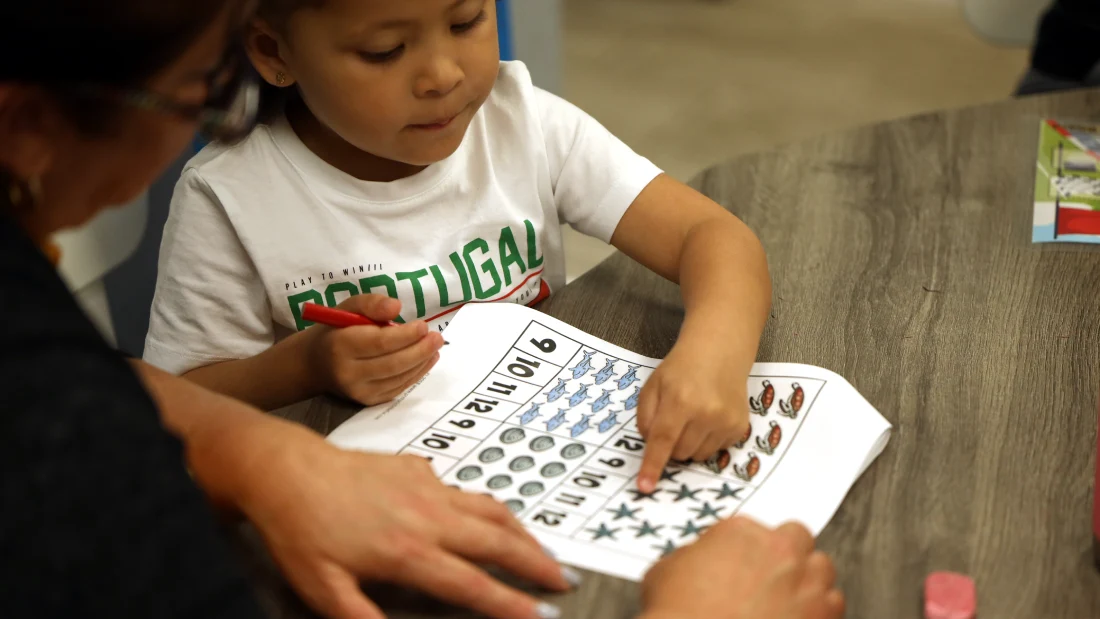Communication is at the heart of human connection, yet many autistic children face challenges in expressing themselves. This has become an increasing concern, especially with recent statistics. According to Medical News Today, about 25-30% of autistic people are minimally verbal or fail to develop functional language. Speech therapy can significantly improve their communication abilities.
Speech therapy serves as a powerful bridge, helping children with Autism Spectrum Disorder (ASD) develop both verbal and non-verbal communication skills. With the right techniques and support, children can gain confidence in their ability to express themselves, fostering stronger connections with their families, peers, and communities.
But how can you tell if your toddler needs speech therapy? In this blog post, we’ll help you identify the early signs of language delays and discuss when it’s time to seek professional help. We’ll also explore different therapy approaches and highlight the benefits of addressing language delays early on.
Language Delays in Autistic Children: Causes and Warning Signs
First, it’s important to distinguish between speech delay and language delay, especially in the context of non-verbal autism.
On one hand, speech delay refers to difficulties in articulating sounds and forming words. A child with a speech delay understands what they want to say but struggles to produce the necessary sounds.
Common signs of speech delay include:
- Difficulty pronouncing words correctly.
- Limited vocabulary usage.
- Omission of difficult sounds or substitution with easier ones.
On the other hand, language delay involves broader difficulties related to understanding and using language in general. It affects both the ability to understand what is being said and the ability to form phrases and sentences.
In this case, some symptoms include:

- Difficulty understanding instructions.
- Problems constructing complex sentences.
- Incorrect use of verb tenses.
- Difficulty following conversations.
What Affects Language Development in Autistic Children
Several key factors influence language development in autistic children, including:
- Genetics – Genetic predisposition can play a crucial role in language acquisition.
- Family Environment – A stimulating and enriched environment can support language growth.
- Early Intervention – Access to speech therapy and specialized programs at an early age can significantly improve communication skills.
- Cognitive Abilities – A child’s cognitive development level can impact language learning.
- Hearing Health – Hearing impairments can affect speech and language acquisition.
- Social Skills – Interacting with peers and adults can promote language use.
- Therapies and Supports – The quality, consistency, and frequency of therapeutic interventions play a vital role in language progress.
Understanding these factors can help parents, educators, and therapists create effective strategies to support language development in autistic children.
Language and Speech Therapy: When to Seek Professional Help?
When we talk about language therapy, we are referring not only to a specialized intervention aimed at improving communication in children with specific impairments but also to autistic children who have not yet developed this skill.
Therefore, it is essential to seek professional help if you observe that your child with autism shows visible or significant difficulties in language development. Here are some signs and key moments when it may be advisable to consult a specialist:
- Lack of Babbling: If a child does not begin to babble or make sounds around 12 months.
- Absence of Words: If by 16 months they have not started saying words.
- Lack of Two-Word Phrases: If by 24 months they are not spontaneously forming two-word phrases.
- Regression of Language: If the child has lost linguistic skills they had previously acquired.
- Difficulty Imitating Sounds: Problems imitating sounds or words.
- Lack of Response to Verbal Cues: Difficulty understanding and following simple verbal instructions.
- Non-Verbal Communication Issues: Difficulties using gestures, facial expressions, and eye contact to communicate.
Early Intervention to Improve Speech in Autistic Children

Early intervention plays a crucial role in supporting the development and communication skills of autistic children. Research shows that therapy programs implemented before the age of three can significantly enhance a child’s ability to communicate and interact with the world around them.
The ideal early intervention approach involves a multidisciplinary team, including psychologists, pediatricians, speech-language pathologists, and child development specialists. A comprehensive evaluation tailored to the child’s unique needs helps create a personalized therapy plan.
Key Benefits of Early Intervention in Speech Therapy:
- Enhances communication skills – Encourages verbal and non-verbal expression.
- Improves social interactions – Helps children engage more effectively with peers and adults.
- Supports cognitive and academic growth – Lays a foundation for learning and problem-solving.
- Develops linguistic abilities – Strengthens speech, vocabulary, and comprehension.
- Reduces problematic behaviors – Helps manage frustration caused by communication barriers.
- Boosts confidence – Encourages self-expression and autonomy.
- Maximizes learning potential – Provides structured support for skill-building.
- Strengthens family bonds – Helps parents and caregivers communicate more effectively with their child.
A well-structured early intervention program, incorporating specialized speech and language techniques, can greatly enhance communication, social skills, and overall quality of life.
ABA Therapy and Speech Therapy: The Perfect Match
Speech Therapy and Applied Behavior Analysis (ABA) Therapy are distinct approaches, however, both aim to improve communication and overall quality of life. They focus on different aspects of development and utilize specific methodologies, making them highly complementary when used together.
Key Differences Between Speech Therapy and ABA Therapy
| Therapy | Main Objective | Methods and Techniques | Scope of Application | Duration | Therapeutic Approach |
| Speech Therapy | Improve verbal and non-verbal communication skills. | Articulation exercises, play-based intervention, and AAC (Augmentative and Alternative Communication). | Focused on language development and communication enhancement. | 30 to 60-minute sessions, one to two times per week. | Individualized, tailored to the child’s specific communication needs. |
| ABA Therapy | Modify and enhance specific behaviors and skills. | Positive reinforcement, behavior intervention, task breakdown, and data analysis. | Addresses a wide range of skills, including communication, academic, and social behaviors. | Intensive—several hours of daily intervention, with individual or group sessions. | Structured, systematic, and focused on behavior analysis and modification. |
How Speech Therapy and ABA Therapy Work Together
While speech therapy focuses on developing communication skills, ABA therapy targets behavioral improvements that support communication and social interaction. When combined, these therapies provide a comprehensive intervention that strengthens both language development and functional communication.
For children with social pragmatic communication disorders or autism, integrating speech therapy and ABA therapy can lead to more effective outcomes, helping them navigate social situations, express their needs, and build meaningful relationships.
Different Approaches in Speech Therapy for Children with ASD

Since every child with Autism Spectrum Disorder (ASD) is unique, personalized and evidence-based approaches are essential to maximize the benefits of speech therapy. Several effective interventions are widely used to support language development and communication skills in autistic children. These include:
- Denver Model Early Intervention (ESDM): Integrates ABA therapy with play-based activities and daily routines to promote communication and social interaction.
- Pivotal Response Treatment (PRT): Focuses on key developmental areas, such as motivation and self-initiation, that influence broader behavioral and communication improvements.
- Augmentative and Alternative Communication (AAC): Uses visual aids (PECS), electronic communication devices, or sign language to support or replace spoken language.
- Play-Based Intervention: Incorporates structured play activities to develop social and communication skills in a natural and engaging way.
- Naturalistic Developmental Behavioral Interventions (NDBI): A hybrid approach that combines elements of ABA and developmental models to encourage spontaneous language and interaction.
The effectiveness of these approaches depends on several factors, including the child’s age, symptom severity, and consistency of intervention. By tailoring therapy to the child’s individual needs, speech therapy can significantly enhance communication abilities and overall development.
Speech and Language Therapy at Koala ABA & Learning Centers
At Koala ABA & Learning Centers, we provide specialized speech and language therapy for autistic children in Miami and surrounding areas. Our programs enhance verbal, non-verbal, and social communication skills, helping children express themselves more effectively.
Beyond spoken language, we support non-verbal communication and alternative methods like Augmentative and Alternative Communication (AAC), using cutting-edge technology and evidence-based techniques.
Looking for personalized speech therapy? Contact us today and let’s work together to support your child’s development. Book a consultation now!








